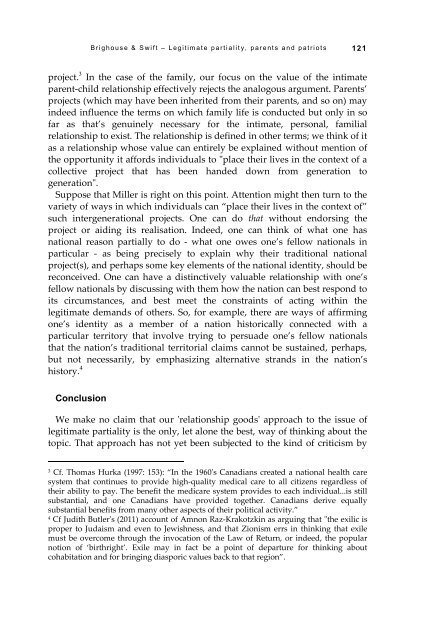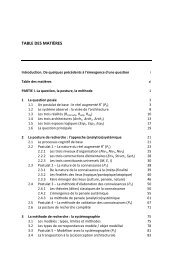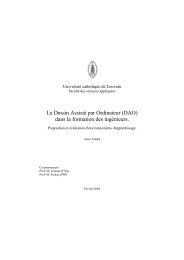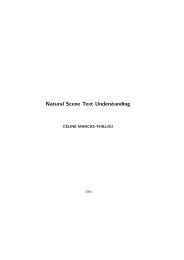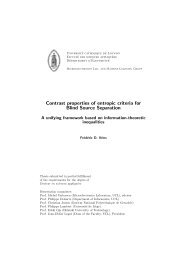- Page 5 and 6:
© Presses universitaires de Louvai
- Page 7 and 8:
6A r g u i n g a b o u t j u s t i
- Page 9 and 10:
8A r g u i n g a b o u t j u s t i
- Page 11 and 12:
10A r g u i n g a b o u t j u s t i
- Page 13 and 14:
12A r g u i n g a b o u t j u s t i
- Page 15 and 16:
14A r g u i n g a b o u t j u s t i
- Page 17 and 18:
16A r g u i n g a b o u t j u s t i
- Page 19 and 20:
18A r g u i n g a b o u t j u s t i
- Page 21 and 22:
20A r g u i n g a b o u t j u s t i
- Page 23 and 24:
22A r g u i n g a b o u t j u s t i
- Page 25 and 26:
24A r g u i n g a b o u t j u s t i
- Page 27 and 28:
26A r g u i n g a b o u t j u s t i
- Page 29 and 30:
28A r g u i n g a b o u t j u s t i
- Page 31 and 32:
30A r g u i n g a b o u t j u s t i
- Page 33 and 34:
32A r g u i n g a b o u t j u s t i
- Page 35 and 36:
34A r g u i n g a b o u t j u s t i
- Page 37 and 38:
36A r g u i n g a b o u t j u s t i
- Page 39 and 40:
38A r g u i n g a b o u t j u s t i
- Page 41 and 42:
40A r g u i n g a b o u t j u s t i
- Page 43 and 44:
42A r g u i n g a b o u t j u s t i
- Page 45 and 46:
44A r g u i n g a b o u t j u s t i
- Page 47 and 48:
46A r g u i n g a b o u t j u s t i
- Page 50 and 51:
Marriages as assets?Real freedom an
- Page 52 and 53:
A l s t o t t - M a r r i a g e s a
- Page 54 and 55:
A l s t o t t - M a r r i a g e s a
- Page 56 and 57:
A l s t o t t - M a r r i a g e s a
- Page 58 and 59:
A l s t o t t - M a r r i a g e s a
- Page 60 and 61:
A l s t o t t - M a r r i a g e s a
- Page 62 and 63:
The guaranteed income as an equalop
- Page 64 and 65:
A r n s p e r g e r & J o h n s o n
- Page 66 and 67:
A r n s p e r g e r & J o h n s o n
- Page 68 and 69:
A r n s p e r g e r & J o h n s o n
- Page 70:
A r n s p e r g e r & J o h n s o n
- Page 73 and 74: 72A r g u i n g a b o u t j u s t i
- Page 75 and 76: 74A r g u i n g a b o u t j u s t i
- Page 77 and 78: 76A r g u i n g a b o u t j u s t i
- Page 80 and 81: Reflections on the limits of argume
- Page 82 and 83: B a k e r - R e f l e c t i o n s o
- Page 84 and 85: B a k e r - R e f l e c t i o n s o
- Page 86 and 87: B a k e r - R e f l e c t i o n s o
- Page 88 and 89: Taxation, fees and social justiceFr
- Page 90 and 91: B l a i s - T a x a t i o n , f e e
- Page 92 and 93: B l a i s - T a x a t i o n , f e e
- Page 94 and 95: Real freedomfor all turtles in Suga
- Page 96 and 97: B o u l a n g e r - R e a l f r e e
- Page 98 and 99: B o u l a n g e r - R e a l f r e e
- Page 100 and 101: B o u l a n g e r - R e a l f r e e
- Page 102 and 103: B o u l a n g e r - R e a l f r e e
- Page 104 and 105: B o u l a n g e r - R e a l f r e e
- Page 106 and 107: Linguistic diversityand economic se
- Page 108 and 109: B o w l e s - L i n g u i s t i c d
- Page 110 and 111: B o w l e s - L i n g u i s t i c d
- Page 112 and 113: B o w l e s - L i n g u i s t i c d
- Page 114 and 115: B o w l e s - L i n g u i s t i c d
- Page 116 and 117: Legitimate partiality, parents and
- Page 118 and 119: B r i g h o u s e & S w i f t - L e
- Page 120 and 121: B r i g h o u s e & S w i f t - L e
- Page 124: B r i g h o u s e & S w i f t - L e
- Page 127 and 128: 126A r g u i n g a b o u t j u s t
- Page 129 and 130: 128A r g u i n g a b o u t j u s t
- Page 131 and 132: 130A r g u i n g a b o u t j u s t
- Page 133 and 134: 132A r g u i n g a b o u t j u s t
- Page 136 and 137: Distributing freedom over whole liv
- Page 138 and 139: C a r t e r - D i s t r i b u t i n
- Page 140 and 141: C a r t e r - D i s t r i b u t i n
- Page 142 and 143: C a r t e r - D i s t r i b u t i n
- Page 144: C a r t e r - D i s t r i b u t i n
- Page 147 and 148: 146A r g u i n g a b o u t j u s t
- Page 149 and 150: 148A r g u i n g a b o u t j u s t
- Page 151 and 152: 150A r g u i n g a b o u t j u s t
- Page 153 and 154: 152A r g u i n g a b o u t j u s t
- Page 155 and 156: 154A r g u i n g a b o u t j u s t
- Page 158 and 159: Why do we blame survivors?Jean-Mich
- Page 160 and 161: C h a u m o n t - W h y d o w e b l
- Page 162 and 163: C h a u m o n t - W h y d o w e b l
- Page 164 and 165: C h a u m o n t - W h y d o w e b l
- Page 166: C h a u m o n t - W h y d o w e b l
- Page 169 and 170: 168A r g u i n g a b o u t j u s t
- Page 171 and 172: 170A r g u i n g a b o u t j u s t
- Page 173 and 174:
172A r g u i n g a b o u t j u s t
- Page 175 and 176:
174A r g u i n g a b o u t j u s t
- Page 177 and 178:
176A r g u i n g a b o u t j u s t
- Page 179 and 180:
178A r g u i n g a b o u t j u s t
- Page 181 and 182:
180A r g u i n g a b o u t j u s t
- Page 183 and 184:
182A r g u i n g a b o u t j u s t
- Page 185 and 186:
184A r g u i n g a b o u t j u s t
- Page 187 and 188:
186A r g u i n g a b o u t j u s t
- Page 189 and 190:
188A r g u i n g a b o u t j u s t
- Page 191 and 192:
190A r g u i n g a b o u t j u s t
- Page 193 and 194:
192A r g u i n g a b o u t j u s t
- Page 195 and 196:
194A r g u i n g a b o u t j u s t
- Page 197 and 198:
196A r g u i n g a b o u t j u s t
- Page 199 and 200:
198A r g u i n g a b o u t j u s t
- Page 201 and 202:
200A r g u i n g a b o u t j u s t
- Page 203 and 204:
202A r g u i n g a b o u t j u s t
- Page 205 and 206:
204A r g u i n g a b o u t j u s t
- Page 207 and 208:
206A r g u i n g a b o u t j u s t
- Page 209 and 210:
208A r g u i n g a b o u t j u s t
- Page 211 and 212:
210A r g u i n g a b o u t j u s t
- Page 213 and 214:
212A r g u i n g a b o u t j u s t
- Page 215 and 216:
214A r g u i n g a b o u t j u s t
- Page 217 and 218:
216A r g u i n g a b o u t j u s t
- Page 219 and 220:
218A r g u i n g a b o u t j u s t
- Page 221 and 222:
220A r g u i n g a b o u t j u s t
- Page 223 and 224:
222A r g u i n g a b o u t j u s t
- Page 225 and 226:
224A r g u i n g a b o u t j u s t
- Page 227 and 228:
226A r g u i n g a b o u t j u s t
- Page 230 and 231:
English or Esperanto:a case for lev
- Page 232 and 233:
F l e u r b a e y - E n g l i s h o
- Page 234 and 235:
F l e u r b a e y - E n g l i s h o
- Page 236:
F l e u r b a e y - E n g l i s h o
- Page 239 and 240:
238A r g u i n g a b o u t j u s t
- Page 241 and 242:
240A r g u i n g a b o u t j u s t
- Page 243 and 244:
242A r g u i n g a b o u t j u s t
- Page 245 and 246:
244A r g u i n g a b o u t j u s t
- Page 247 and 248:
246A r g u i n g a b o u t j u s t
- Page 249 and 250:
248A r g u i n g a b o u t j u s t
- Page 251 and 252:
250A r g u i n g a b o u t j u s t
- Page 253 and 254:
252A r g u i n g a b o u t j u s t
- Page 255 and 256:
254A r g u i n g a b o u t j u s t
- Page 257 and 258:
256A r g u i n g a b o u t j u s t
- Page 259 and 260:
258A r g u i n g a b o u t j u s t
- Page 262 and 263:
Should a Marxistbelieve in human ri
- Page 264 and 265:
L a c r o i x - S h o u l d a M a r
- Page 266 and 267:
L a c r o i x - S h o u l d a M a r
- Page 268:
L a c r o i x - S h o u l d a M a r
- Page 271 and 272:
270A r g u i n g a b o u t j u s t
- Page 273 and 274:
272A r g u i n g a b o u t j u s t
- Page 275 and 276:
274A r g u i n g a b o u t j u s t
- Page 277 and 278:
276A r g u i n g a b o u t j u s t
- Page 279 and 280:
278A r g u i n g a b o u t j u s t
- Page 281 and 282:
280A r g u i n g a b o u t j u s t
- Page 284 and 285:
A universal duty to careIngrid Robe
- Page 286 and 287:
R o b e yn s - A u n i v e r s a l
- Page 288 and 289:
R o b e yn s - A u n i v e r s a l
- Page 290 and 291:
R o b e yn s - A u n i v e r s a l
- Page 292 and 293:
The ideological roots of inequality
- Page 294 and 295:
R o e m e r - T h e i d e o l o g i
- Page 296 and 297:
R o e m e r - T h e i d e o l o g i
- Page 298 and 299:
R o e m e r - T h e i d e o l o g i
- Page 300 and 301:
R o e m e r - T h e i d e o l o g i
- Page 302 and 303:
R o e m e r - T h e i d e o l o g i
- Page 304 and 305:
Philosophers andtaboo trade-offs in
- Page 306 and 307:
S c h o k k a e r t - P h i l o s o
- Page 308 and 309:
S c h o k k a e r t - P h i l o s o
- Page 310:
S c h o k k a e r t - P h i l o s o
- Page 313 and 314:
312A r g u i n g a b o u t j u s t
- Page 315 and 316:
314A r g u i n g a b o u t j u s t
- Page 317 and 318:
316A r g u i n g a b o u t j u s t
- Page 319 and 320:
318A r g u i n g a b o u t j u s t
- Page 322 and 323:
On genetic inequalityHillel Steiner
- Page 324 and 325:
S t e i n e r - O n g e n e t i c i
- Page 326 and 327:
S t e i n e r - O n g e n e t i c i
- Page 328 and 329:
A federal electoral district for Be
- Page 330 and 331:
S t o j a n o v i c - A f e d e r a
- Page 332 and 333:
S t o j a n o v i c - A f e d e r a
- Page 334 and 335:
S t o j a n o v i c - A f e d e r a
- Page 336:
S t o j a n o v i c - A f e d e r a
- Page 339 and 340:
338A r g u i n g a b o u t j u s t
- Page 341 and 342:
340A r g u i n g a b o u t j u s t
- Page 343 and 344:
342A r g u i n g a b o u t j u s t
- Page 345 and 346:
344A r g u i n g a b o u t j u s t
- Page 347 and 348:
346A r g u i n g a b o u t j u s t
- Page 349 and 350:
348A r g u i n g a b o u t j u s t
- Page 351 and 352:
350A r g u i n g a b o u t j u s t
- Page 353 and 354:
352A r g u i n g a b o u t j u s t
- Page 355 and 356:
354A r g u i n g a b o u t j u s t
- Page 357 and 358:
356A r g u i n g a b o u t j u s t
- Page 359 and 360:
358A r g u i n g a b o u t j u s t
- Page 361 and 362:
360A r g u i n g a b o u t j u s t
- Page 363 and 364:
362A r g u i n g a b o u t j u s t
- Page 365 and 366:
364A r g u i n g a b o u t j u s t
- Page 368 and 369:
Lamentationin the face of historica
- Page 370 and 371:
V r o u s a l i s - L a m e n t a t
- Page 372 and 373:
V r o u s a l i s - L a m e n t a t
- Page 374 and 375:
V r o u s a l i s - L a m e n t a t
- Page 376:
V r o u s a l i s - L a m e n t a t
- Page 379 and 380:
378A r g u i n g a b o u t j u s t
- Page 381 and 382:
380A r g u i n g a b o u t j u s t
- Page 383 and 384:
382A r g u i n g a b o u t j u s t
- Page 385 and 386:
384A r g u i n g a b o u t j u s t
- Page 388 and 389:
Why we demand anunconditional basic
- Page 390 and 391:
W i d e r q u i s t - T h e E C S O
- Page 392 and 393:
W i d e r q u i s t - T h e E C S O
- Page 394 and 395:
W i d e r q u i s t - T h e E C S O
- Page 396 and 397:
Linguistic protectionismand wealth
- Page 398 and 399:
W i l l i a m s - L i n g u i s t i
- Page 400 and 401:
W i l l i a m s - L i n g u i s t i
- Page 402 and 403:
W i l l i a m s - L i n g u i s t i
- Page 404 and 405:
In defense of genderlessnessErik Ol
- Page 406 and 407:
W r i g h t - I n d e f e n s e o f
- Page 408 and 409:
W r i g h t - I n d e f e n s e o f
- Page 410 and 411:
W r i g h t - I n d e f e n s e o f
- Page 412 and 413:
W r i g h t - I n d e f e n s e o f
- Page 414:
W r i g h t - I n d e f e n s e o f
- Page 417 and 418:
416A r g u i n g a b o u t j u s t
- Page 419 and 420:
418A r g u i n g a b o u t j u s t
- Page 421 and 422:
420A r g u i n g a b o u t j u s t
- Page 423:
422A r g u i n g a b o u t j u s t


